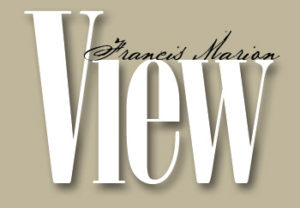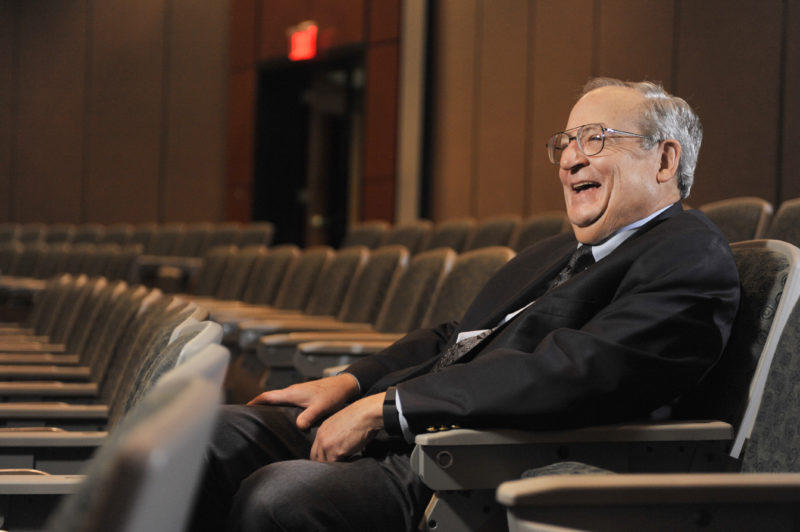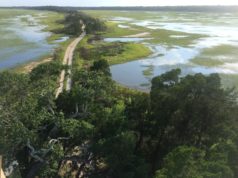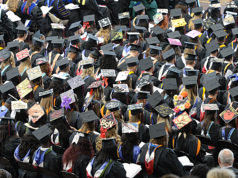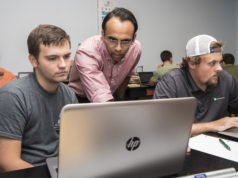Rich Chapman wasn’t a born administrator but he was a very good one
He was a small town Missouri boy, the product of a middle class family defined by its roots in the Great Depression.
Leon and Otelia Chapman may not have had a precise plan for Richard, their youngest son, but they were sure about one thing: he’d be educated. The Chapman’s had wanted that for themselves, dreamed of it, but the financial realities of the Great Depression rendered it impossible. Times were better by the 1960s, however. They’d scrimped and saved. And they insisted. Richard would go to college.
He did.
And, once he got there he never left.
Rich Chapman will retire this May following a 46-year career in academia. Most of it has been spent at Francis Marion University, where he served for 27 years, the past 17 as the university’s Provost.
Leaving all that behind isn’t easy — Chapman has postponed the day for several years in part because of some reluctance along those lines – but it’s clear to him that now is the time.
“It does feel like this is the right thing to do,” Chapman says. “I know there are parts of it – the great people I’ve had the pleasure to work with – that I will miss terribly. But there are things that (his wife) Marylin and I want to do while we still can. I’m ready for this.”
No boasting
Chapman may be ready. Others at the university may not. Chapman will leave behind a legacy remarkable for both its constancy and its content.
He’s been Provost at FMU for more than a third of university’s life, and those years surely have been some of FMU’s most vital and most critical.
Working in tandem with his good friend Dr. Fred Carter, Chapman has presided over a period of extraordinary growth and maturation at FMU. During his stay, the university has blossomed from its beginnings as a small, regional liberal arts college to a comprehensive university offering an array of professional programs. And, thanks to some of the initiatives that Chapman helped champion, it’s poised to grow and prosper in the years ahead.
Chapman is proud of what he’s done, but not much inclined to boast about it. Asked for a summary of his provostian labors, he says, “Well, I think it’s fair to say FMU has become a more … complex place.”
Carter, his boss, but more importantly his long-time friend, is more effusive.
“In 17 years here,” says Carter, “hiring Rich Chapman was the best decision I made.”
Steady hand
Chapman’s role has been to provide the steadying hand for the university’s core – it’s faculty and academic life. Managing that world – hundreds of independent minds ready to exercise the academic freedom that is their right and privilege – is a challenge at any university. It was especially so early in Chapman’s FMU tenure when the university was transitioning into that bigger, more complex place Chapman mentioned.
Chapman’s ability to build consensus and present reasoned arguments for new programs and processes helped lead the university into a new world. His reputation as a serious academician himself – he’d already been chair of FMU’s Department of History for 10 years when he was picked for the Provost’s job – gave his voice weight. But the manner in which he employed it helped too.
Although he can be stern and forceful when the situation demands it, he is basically an affable and engaging person who few find hard to befriend.
Ron Faulkenberry, who retired as Dean of the School of Education in 2013 and worked with Chapman throughout his tenure as provost, says Chapman’s success starts with the fact that “basically he’s just an outstanding person, and that enabled him to be an outstanding provost.
“I really don’t think you can separate the two,” says Faulkenberry. “Rich is very likeable. He’s patient, he’s well spoken and he’s an excellent communicator. Those are some great skills for what is a very difficult job.”
Carter agrees and says Chapman’s intellectual abilities have been a boon as well.
“He’s a great scholar in his own right, is very well read and is deeply reflective,” says Carter. “Rich’s ability to reflect, to think thoughtfully about a subject, in asset most of the time, but it’s been especially helpful on the really tough issues we’ve faced. I know he’s made me a better president, a better person. I can’t say enough about that.”
Chapman’s array of skills have all helped him find his way in administration, as his ability to make them work together. They make up what Chapman calls his discovered “knack” for academic administration. That knack was the key to success in the capstone of Chapman’s academic career, his tour as a provost. Of course, that move also signaled the end to a superb career as a lecturer and researcher.
Fork in the road
Like every scholar who faces that choice, Chapman’s decision to take the administrative fork in the road wasn’t easy. He tried to temper it by teaching one course his first year in the Provost’s chair, but found the dual load too daunting. He couldn’t give his work as Provost short shrift, and he wouldn’t teach a class where he was not fully engaged.
Ironically, Chapman’s last course — a multidisciplinary course entitled History of Economics – was one of his most enjoyable.
“The students I had in that class were exceptional,” says Chapman. “And because it was kind of new for me I was learning as much as they were I think. It was really delightful but ….”
His voice trails off. He’d made a commitment to a different calling and that was his future. Fortunately – and this was another part of the knack perhaps – Chapman found much of that delightful, too.
“I had enjoyed being a department chair,” says Chapman. “I found that I liked solving problems. I had enjoyed managing the honors program (another duty at FMU prior to becoming provost) and being a division head at Wells (College, Chapman’s appointment prior to FMU). I found a real pleasure in helping someone else get where they wanted to be, achieve what they were hoping to achieve.
“That’s also some satisfaction in work that makes the organization you are part of stronger,” says Chapman. “I hope I’ve done some of that at FMU. I have enjoyed that. … And then, there’s working with Fred. That’s the real reason I’ve stayed in this position.”
Oddly enough, given the long-term success of their relationship, Carter and Chapman never met until the day Chapman returned to FMU to interview for the provost position. Nonetheless, the connection was complete … maybe even completing.
“We were good friends after just a few weeks,” says Carter. “It developed quickly and in way that was very unusual, very natural. We shared a lot of the same views of the obligations of a university, its faculty, of scholars and much more. Pretty soon there wasn’t much need to think about the role of the president, or the role of the provost in this matter or that. It was very intuitive. We often shared different opinions — and I will say that I learned a tremendous amount from sitting and listening to Rich — but we never disagreed.”
On anything?
Carter shrugs.
“In 17 years there are only two issues where have had real division,” he says, “and that’s on whether or not Pete Rose should be allowed in the Baseball Hall of Fame and, on an annual basis, who had the better ball club, the Braves or the Cardinals.”
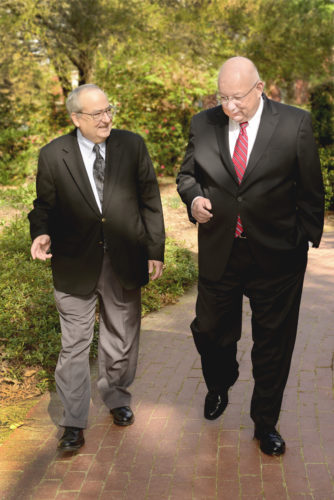
Carter says Chapman deserves full credit for the growth of FMU’s academic schools and departments, and a lion’s share of the accolades of the ever-improving quality of the FMU faculty.
“Of course the faculty itself, committees, chairs, many hands, played a role in those hires,” says Carter, “but Rich was always there, right in the middle, directing traffic.”
As a team, Carter and Chapman have presided over the addition of bold new programs in healthcare and engineering, increased the pace of faculty research and broadened FMU’s engagement with the region.
Chapman acknowledges a role, but gives Carter much of the credit.
“He’s a terrific person, a great administrator and a real academician,” says Chapman. “He seems the perfect combination for a university president. I know virtually everyone on campus feels like that, too, which is unusual. These have been great years for me. I haven’t regretted a minute of it.”
A scholar’s calculus
Chapman’s parents insisted he go to college, but didn’t say which one. Chapman picked Washington University in St. Louis, which was reasonably close to his hometown of Sikeston, Mo.
His original plan was to study one of the sciences, probably Physics, but what he terms, “an unfortunate encounter” with college calculus sent him looking for safer havens. His next thought was law but he discovered “that I didn’t much like what lawyers did on a daily basis.
“Not to disparage an entire profession,” says Chapman, “but it wasn’t for me.”
History was. Chapman was interested right from the start. Early on, he focused his gaze on American history, particularly the politics of the Great Depression. The era fascinated him because of what he’d heard about the “bad old days” from his parents. Delving into the machinations of the U.S. policy makers of that time left him enthralled.
“What happened then, in and just after World War II, was truly transformative for this nation,” says Chapman. “It revolutionized American life.
“Most people don’t remember now, but in the 1930s, few Americans paid taxes. The war changed all that. They needed the revenue collected more quickly and, because 50 percent of U.S. production went to military, there was a real shortage of many goods. You had lots of dollars chasing goods that would not, could not exist. So there had to be big changes, a coordinated approach to avoid massive inflation.
“The war,” says Chapman, “foreshadowed what happened in the post-war period, the establishment of the Welfare State and all – which, by the way, I don’t necessarily consider a bad thing.”
Chapman’s scholarly research and writing focused on politics and policy in the Great Depression and during World War II. Much of what went on straddled the world of economics, so he became a student of economic history as well.
Warmer climes
Chapman was an exemplary student. He graduated magna cum laude from Washington U. and was inducted into Phi Beta Kappa, the national honor society. He went to Yale, where he earned both his Master’s and PhD., on a prestigious Yale Fellowship.
Chapman quickly demonstrated skill as a teacher. He won the Yale Prize Teaching Fellowship for excellence in teaching while completing his doctoral work, and won National Endowment for the Humanities teaching grants during his first, full-time professorial gig at Wells College in upstate New York.
At Wells, Chapman’s skills as an academic administrator began to come to light. Though just in his 30s, Chapman held a number of administrative positions, including chair of the humanities division, and a half dozen other subcommittees and advisory groups.
A full-fledged departmental chairmanship seemed the next logical step and that notion, coupled with several particularly cruel winters in the late 1980s, meant Chapman was more than interested when he read that the History Department at Francis Marion University (then College) in sunny South Carolina was looking for a new chairman. Chapman applied for the post and was selected for it. It turned out to be a superb match. His sensibilities fit the growing college/university and he and his wife Marilyn fell in love with FMU and Florence.
“We knew it was warmer place and it appeared to be an interesting place,” says Chapman. “Then we moved here and soon were very taken with the people, both on and off campus. They were very warm and friendly. It was, and is, a wonderful place.”
Chapman’s leadership in his department made an impression. It was obvious, as Chapman notes, that he had “a knack” for administrative work. But before that knack could be fully employed … a slight detour.
On to Georgia
The ever-diplomatic Rich Chapman calls Francis Marion’s controversial executive change in the mid-1990s “a time of transition, an unpleasant time.
“The university was maturing and the faculty wanted a bigger role,” Chapman says. “It was a clash. I didn’t feel comfortable.”
So, he left.
Another moderately sized state college in a warm place – West Georgia College in Carrollton, Ga. – needed a steady hand to guide its history department. Chapman applied there and was hired. It seemed like the thing to do, but then FMU’s trustees made another presidential change, bringing in Fred Carter. Even before arriving on campus to assume his new position, Carter heard from Francis Marion faculty that a very good man — they meant Chapman — was headed out the door. Carter called the man who eventually become one of his very best friends. Would he consider staying? Chapman was intrigued. He’d heard lots of good news about Carter, too. But it was too late. He was committed to West Georgia. It would have been unethical to renege, he told his future friend.
Carter ended the conversation prophetically. “Maybe we’ll have the chance to work together somewhere down the road,” he told Chapman. Maybe, thought Chapman, but most likely not.
“We were headed to Georgia,” Chapman says, “We figured that would be it, that was the last position, the last place we’d ever be.”
Less than a year later, Chapman was surprised to get a call, asking him to throw his name into the hat as FMU’s provost. There was some trepidation — he’d just arrived — but it was “clearly what I wanted to do.” He applied, was selected for the post thanks to some backing from his old FMU friends, and then had to tell his new friends at West Georgia some hard news.
“That was a very hard thing to do,” says Chapman, “especially to tell the members of the (history) department. But FMU was a unique opportunity. I wanted to do something like that in my career, and … I wanted to work for Fred. I didn’t know him, but from all I understood he was a person of great vision and competence and he’d already done quite a bit. When I went back to be interviewed – it was six months or so after I left – I could hardly believe the difference. You could feel it.”
No more meetings
Having postponed retirement a few years longer than he might, in large part because of Carter’s annual entreaties for “one more year,” Chapman figures he’ll be busy for awhile. He and Marilyn enjoy travel but haven’t been everywhere they want to be. Among other adventures, he’s always wanted to go to Hawaii … you know to see Pearl Harbor and the other historical sites.
The couple also have two grandchildren in California. They get to see them with some regularity, but cross country means it’s not nearly as often as they’d like. That will certainly change once Chapman calls the roll at his last graduation this May.
Chapman says there’s an outside chance he may resume some academic work. Projects abandoned 17 years ago, plus others dreamed up since, still beckon. So does the example of his brother, who, nine years after retirement, is still active as researcher and writer.
What Chapman won’t do is spend time at agency hearings or faculty meetings that go on just a bit too long. There’ll be no more parent conferences or government paperwork.
He does have a knack for all that. But he’s done his time.
